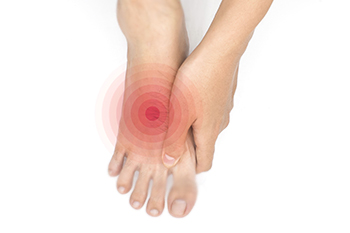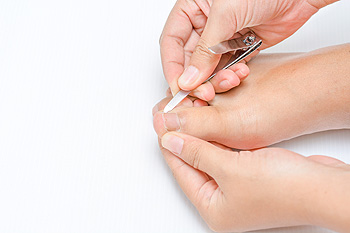
Peripheral neuropathy in people with diabetes often affects the feet, toes, and ankles, leading to symptoms such as numbness, tingling, or reduced sensation. This can make it difficult to detect minor injuries, which may become serious without proper care. For example, a small blister from wearing poorly fitting shoes or a cut from stepping on something sharp can go unnoticed and develop into a diabetic foot ulcer. Ulcers are slow-healing wounds that can become infected, especially when high blood sugar levels restrict blood flow to the feet. Reduced circulation limits the delivery of infection-fighting cells, increasing the risk of complications like gangrene. In cases where gangrene develops, surgery may be required to remove damaged tissue, and, in severe situations, loss of a toe or foot might result. A podiatrist can provide regular foot exams, remove damaged tissue, treat ulcers, and help manage infections before they progress. If you have foot issues caused by diabetes, it is suggested that you schedule regular appointments with a podiatrist for appropriate treatment.
Neuropathy
Neuropathy can be a potentially serious condition, especially if it is left undiagnosed. If you have any concerns that you may be experiencing nerve loss in your feet, consult with Dr. Mark Spier from Maryland. Our doctor will assess your condition and provide you with quality foot and ankle treatment for neuropathy.
What Is Neuropathy?
Neuropathy is a condition that leads to damage to the nerves in the body. Peripheral neuropathy, or neuropathy that affects your peripheral nervous system, usually occurs in the feet. Neuropathy can be triggered by a number of different causes. Such causes include diabetes, infections, cancers, disorders, and toxic substances.
Symptoms of Neuropathy Include:
- Numbness
- Sensation loss
- Prickling and tingling sensations
- Throbbing, freezing, burning pains
- Muscle weakness
Those with diabetes are at serious risk due to being unable to feel an ulcer on their feet. Diabetics usually also suffer from poor blood circulation. This can lead to the wound not healing, infections occurring, and the limb may have to be amputated.
Treatment
To treat neuropathy in the foot, podiatrists will first diagnose the cause of the neuropathy. Figuring out the underlying cause of the neuropathy will allow the podiatrist to prescribe the best treatment, whether it be caused by diabetes, toxic substance exposure, infection, etc. If the nerve has not died, then it’s possible that sensation may be able to return to the foot.
Pain medication may be issued for pain. Electrical nerve stimulation can be used to stimulate nerves. If the neuropathy is caused from pressure on the nerves, then surgery may be necessary.
If you have any questions, please feel free to contact one of our offices located in Columbia and Reisterstown, MD . We offer the newest diagnostic and treatment technologies for all your foot care needs.

Ankle sprains are common in volleyball due to frequent jumping, sudden direction changes, and rapid lateral movements. Landing on an uneven surface, stepping on another player's foot, or twisting the ankle during play can stretch or tear the ligaments. The severity of a sprain is classified into grades. A Grade 1 sprain involves mild stretching of the ligament with slight swelling and discomfort. A Grade 2 sprain results in a partial ligament tear, moderate swelling, bruising, and difficulty bearing weight. A Grade 3 sprain is a complete ligament tear, leading to severe pain, significant swelling, instability, and an inability to walk. Proper warm-ups, strengthening exercises, and footwear with adequate support help reduce the risk of ankle sprains. If you have sprained your ankle while playing volleyball, it is suggested that you visit a podiatrist who can offer appropriate treatment.
Ankle sprains are common but need immediate attention. If you need your feet checked, contact Dr. Mark Spier from Maryland. Our doctor can provide the care you need to keep you pain-free and on your feet.
How Does an Ankle Sprain Occur?
Ankle sprains take place when the ligaments in your ankle are torn or stretched beyond their limits. There are multiple ways that the ankle can become injured, including twisting or rolling over onto your ankle, putting undue stress on it, or causing trauma to the ankle itself.
What Are the Symptoms?
- Mild to moderate bruising
- Limited mobility
- Swelling
- Discoloration of the skin (depending on severity)
Preventing a Sprain
- Wearing appropriate shoes for the occasion
- Stretching before exercises and sports
- Knowing your limits
Treatment of a Sprain
Treatment of a sprain depends on the severity. Many times, people are told to rest and remain off their feet completely, while others are given an air cast. If the sprain is very severe, surgery may be required.
If you have suffered an ankle sprain previously, you may want to consider additional support such as a brace and regular exercises to strengthen the ankle.
If you have any questions please feel free to contact one of our offices located in Columbia and Reisterstown, MD . We offer the newest diagnostic and treatment technologies for all your foot and ankle needs.

Ingrown toenails occur when the edges of a toenail grow into the surrounding skin, causing pain, redness, and swelling. This condition is often seen in the big toe and can sometimes lead to infection. One of the key causes of ingrown toenails is improper nail trimming, such as cutting nails too short or rounding the edges. Other factors include wearing tight shoes that crowd the toes or injure the nail. Toenail thickening, often caused by fungal infections, can also increase the risk of ingrown nails by altering the shape of the nail and making it more likely to dig into the skin. Ingrown toenails may improve with care such as soaking and proper trimming, but severe cases require professional treatment. A podiatrist can safely remove part of the nail, treat any infection, and provide advice on proper nail care and footwear to prevent recurrence. If you have an ingrown toenail, it is suggested that you schedule an appointment with a podiatrist.
Ingrown toenails can become painful if they are not treated properly. For more information about ingrown toenails, contact Dr. Mark Spier of Maryland. Our doctor can provide the care you need to keep you pain-free and on your feet.
Ingrown Toenails
Ingrown toenails occur when a toenail grows sideways into the bed of the nail, causing pain, swelling, and possibly infection.
Causes
- Bacterial infections
- Improper nail cutting such as cutting it too short or not straight across
- Trauma to the toe, such as stubbing, which causes the nail to grow back irregularly
- Ill-fitting shoes that bunch the toes too close together
- Genetic predisposition
Prevention
Because ingrown toenails are not something found outside of shoe-wearing cultures, going barefoot as often as possible will decrease the likeliness of developing ingrown toenails. Wearing proper fitting shoes and using proper cutting techniques will also help decrease your risk of developing ingrown toenails.
Treatment
Ingrown toenails are a very treatable foot condition. In minor cases, soaking the affected area in salt or antibacterial soaps will not only help with the ingrown nail itself, but also help prevent any infections from occurring. In more severe cases, surgery is an option. In either case, speaking to your podiatrist about this condition will help you get a better understanding of specific treatment options that are right for you.
If you have any questions please feel free to contact one of our offices located in Columbia and Reisterstown, MD . We offer the newest diagnostic and treatment technologies for all your foot and ankle needs.

Workers can help prevent foot injuries in the workplace by wearing protective footwear suited to their job environment. Steel toe shoes provide strong protection against heavy objects and compression hazards, making them ideal for construction and industrial settings. Alloy toe shoes offer similar protection while being lighter in weight, reducing strain on the feet during long shifts. Composite toe shoes are made from non-metal materials, providing protection without conducting heat or electricity, which is beneficial in certain work environments. In addition to toe protection, footwear should fit properly, have slip-resistant soles, have adequate arch support and cushioning to reduce fatigue, and improve comfort. If you develop foot pain while working, it is suggested that you visit a podiatrist who can guide you on what type of shoes to wear during your work day.
While working on the feet, it is important to take the proper care of them. For more information about working on your feet, contact Dr. Mark Spier from Maryland. Our doctor will treat your foot and ankle needs.
Working on Your Feet
Standing on your feet for long periods of time can cause stress and pain in your feet. Your whole body may experience change in terms of posture, back pain, bunions, callouses and or plantar warts. There are ways to avoid these conditions with proper foot care, smart choices and correct posture.
Positive Changes
Negative heeled shoe – Choosing this shoe type places the heel slightly lower than the ball of the foot. These are great for overall foot health. Find shoes that fit you correctly.
Go barefoot – Our feet were not designed to be enclosed for all hours of the day. Try to periodically expose your feet to air.
Eliminate Pain
Foot Exercises – Performing simple exercises, incorporating yoga and doing stretches are beneficial. This will allow increased blood flow to the area and muscles of the foot.
Achilles tendon – Stretching the foot out flat on the floor will relax the calf muscles and tendon. These exercises can be performed almost anywhere. Make sure you add these exercises to your daily regimen.
With a little bit of this information and knowing more about foot health, you will notice changes. Foot stretches and proper footwear will help with pain and prevent further issues.
If you have any questions please feel free to contact one of our offices located in Columbia and Reisterstown, MD . We offer the newest diagnostic and treatment technologies for all your foot and ankle needs.









